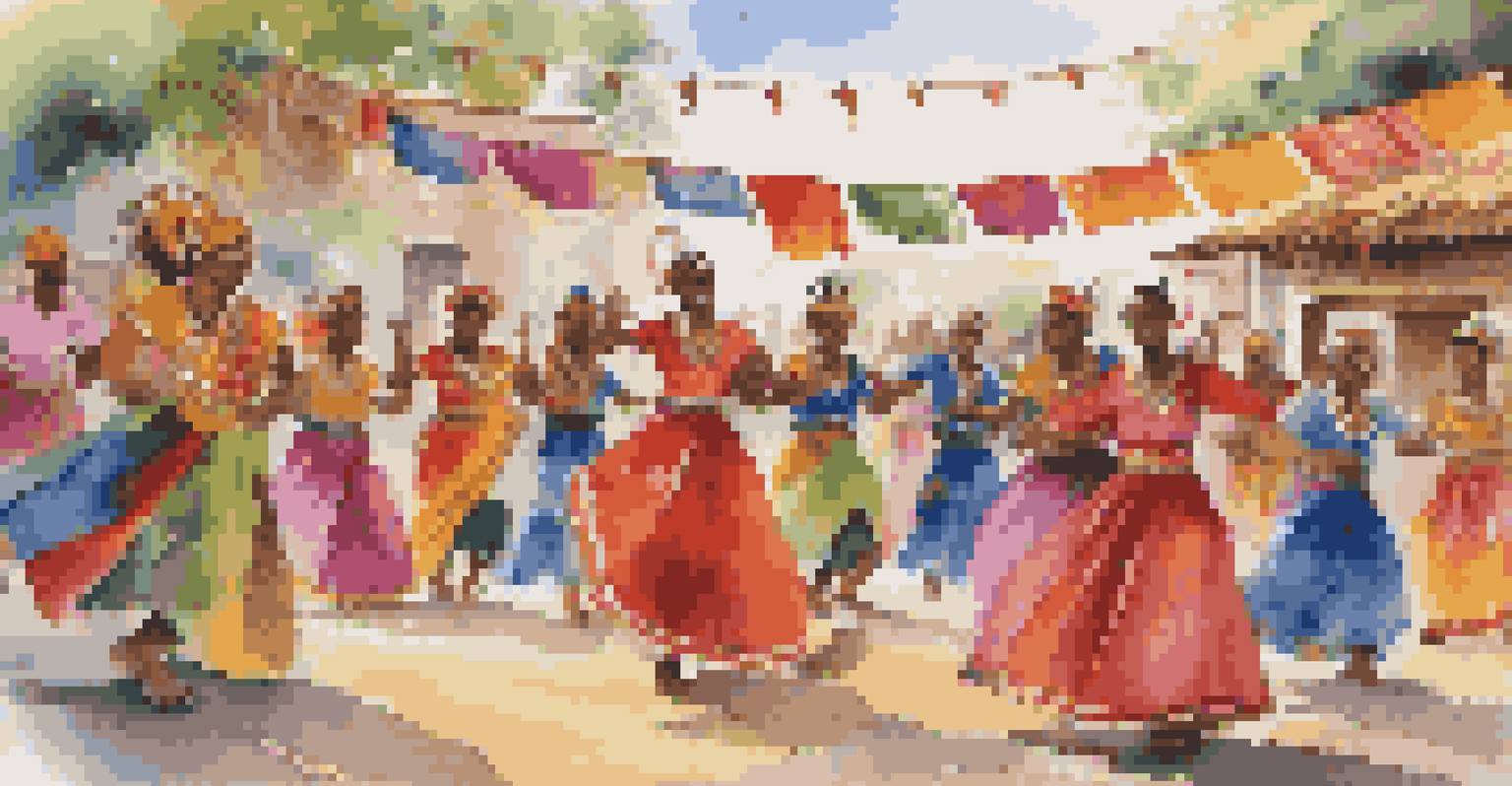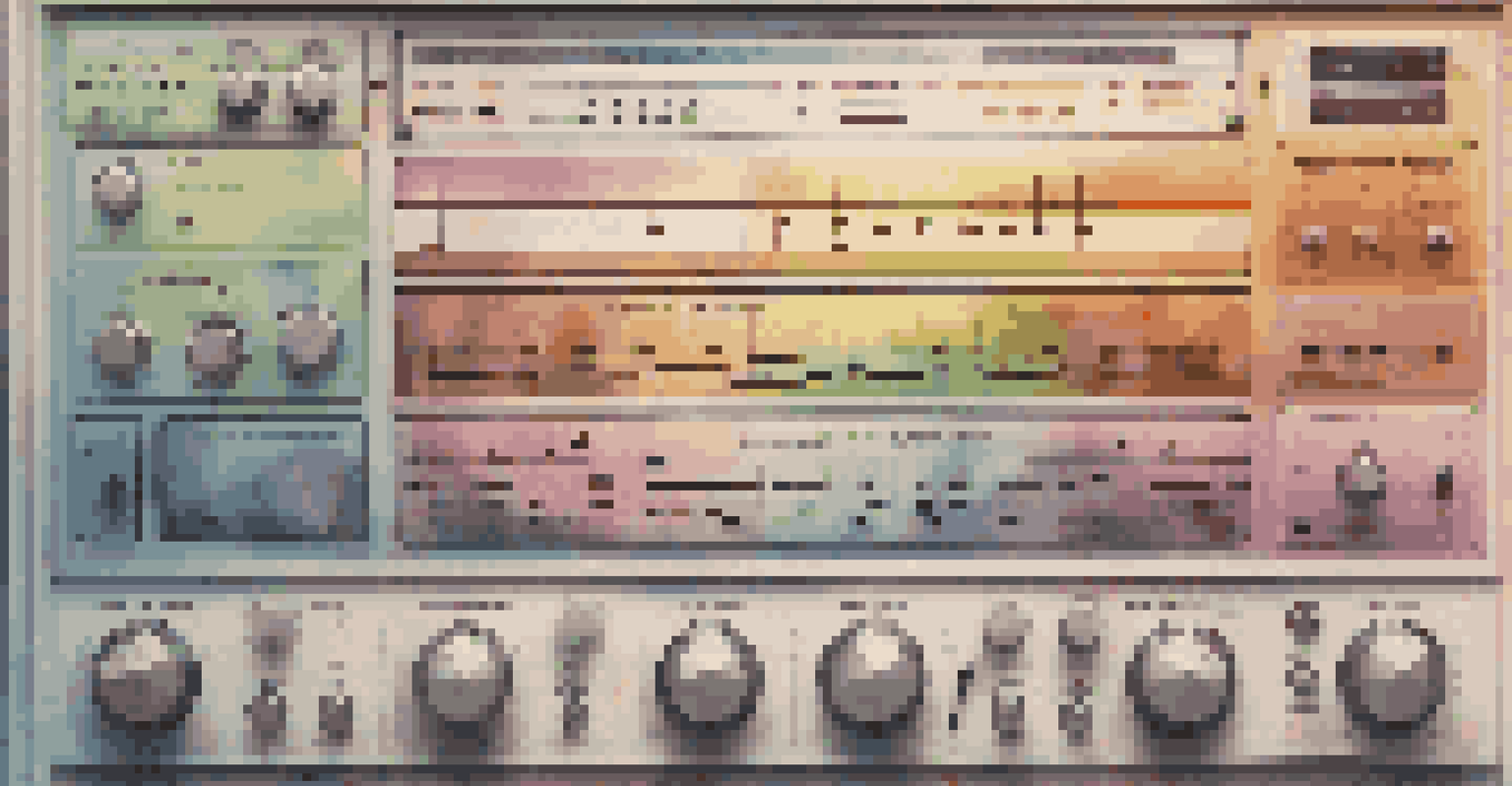The Connection Between Music and Spiritual Experiences

The Historical Ties Between Music and Spirituality
Throughout history, music has been intertwined with spiritual practices. From ancient rituals to modern worship, sound has served as a bridge to the divine. Cultures worldwide have used music not just for entertainment, but as a means to connect with spiritual realms.
Music can change the world because it can change people.
Take, for instance, the Gregorian chants of the Middle Ages. These haunting melodies were designed to elevate the soul and create a sacred atmosphere during religious ceremonies. Similarly, many Indigenous cultures incorporate drumming and singing into their spiritual rituals, emphasizing music's role in fostering community and connection.
These historical examples illustrate that music is more than just a form of art; it's a powerful tool for spiritual expression and experience. As we explore this connection further, we can see how it resonates with contemporary practices and beliefs.
How Music Facilitates Spiritual Awakening
Music has a unique ability to evoke emotions, making it a catalyst for spiritual awakening. When we listen to certain melodies or harmonies, they can trigger profound feelings, leading us to moments of introspection and enlightenment. This emotional power is often what draws people to music during their spiritual journeys.

For example, many report feeling a deep sense of peace or unity while listening to soothing instrumental music during meditation. This experience can open a pathway to self-discovery, allowing individuals to confront their thoughts and feelings in a safe space. It’s as if the music creates a protective bubble, encouraging vulnerability and reflection.
Music Enhances Spiritual Connection
Throughout history, music has served as a powerful tool for spiritual expression and connection across various cultures.
Ultimately, music can be a guide on our spiritual quests, helping us to navigate our inner landscapes. By engaging with music mindfully, we can enhance our spiritual practices and deepen our understanding of ourselves.
The Science Behind Music and Spirituality
Research has shown that music can trigger physiological responses that enhance spiritual experiences. When we listen to music, our brains release dopamine, the 'feel-good' hormone, which can lead to feelings of joy and transcendence. This chemical reaction can make spiritual experiences feel more profound and impactful.
Where words fail, music speaks.
Moreover, studies have indicated that communal music-making, such as singing in a choir or drumming in a circle, can create a sense of belonging and connectedness among participants. This collective experience can amplify feelings of spirituality, fostering a deeper bond with both the community and the divine.
Understanding the science behind this connection helps us appreciate the powerful role music plays in spiritual life. It’s fascinating to realize that our bodies respond to music in ways that enhance our emotional and spiritual well-being.
Music as a Tool for Meditation and Mindfulness
Incorporating music into meditation practices can significantly enhance the experience. Soft, ambient sounds can create an atmosphere conducive to relaxation, allowing the mind to settle and focus. This combination of music and meditation often leads to deeper states of consciousness and spiritual exploration.
For instance, many meditation apps offer playlists specifically designed to accompany guided sessions. These musical selections can help individuals maintain their focus, grounding them while they navigate their thoughts. The rhythm and tones can also serve as anchors, pulling them back when their minds begin to wander.
Music Evokes Emotional Awakening
The emotional power of music can trigger introspection and enlightenment, guiding individuals on their spiritual journeys.
Thus, music becomes an invaluable tool for those seeking to deepen their meditation practice. By consciously selecting music that resonates with their intentions, individuals can tailor their spiritual experiences to be more enriching and transformative.
Cultural Variations in Music and Spiritual Expression
Different cultures have unique musical traditions that reflect their spiritual beliefs and practices. From the chants of Tibetan monks to the ecstatic dances of Sufi mystics, music takes on various forms and meanings across the globe. Each cultural expression offers a glimpse into how music can facilitate spiritual connection.
For example, in many African cultures, music is an integral part of spiritual ceremonies, often used to honor ancestors or celebrate community. These performances are not merely entertainment; they serve as a conduit for spiritual energy and connection to the past. Similarly, in Native American traditions, music often plays a role in healing rituals, reinforcing the linkage between sound and spirituality.
Exploring these cultural variations deepens our understanding of music’s role in spiritual expression. It highlights how, despite differing practices, the fundamental desire for connection to something greater remains universal.
Personal Stories: Music and Spiritual Transformations
Personal narratives often illustrate the profound impact of music on spiritual journeys. Many individuals recount experiences where a specific song or piece of music sparked a moment of clarity or transformation. These stories demonstrate how music can act as a catalyst for change, guiding people through challenging times.
One powerful example is the story of someone who discovered a deep sense of purpose while listening to a particular genre of music during a life crisis. The lyrics resonated with their struggles, providing comfort and inspiration. This transformative experience led them to explore their spirituality more deeply, ultimately changing the course of their life.
Digital Age Transforms Spiritual Music
Technology has made spiritual music more accessible, fostering online communities and new avenues for collective spiritual experiences.
Such personal stories remind us that music is not just a backdrop to our lives; it can be a guiding force in our spiritual evolution. By sharing these experiences, we can inspire others to explore the connections between their own musical preferences and spiritual journeys.
The Future of Music and Spirituality in a Digital Age
As technology evolves, so too does the relationship between music and spirituality. The rise of digital platforms has made spiritual music more accessible than ever, allowing individuals to explore diverse genres and practices from around the world. This accessibility can enrich personal spiritual journeys, offering new avenues for exploration.
Moreover, virtual communities centered around music and spirituality are blossoming online. People are finding connection and support through shared musical experiences, whether it's via live-streamed events or social media groups focused on specific spiritual practices. This digital shift has opened up new possibilities for collective spiritual experiences, transcending geographical boundaries.

Looking ahead, the future of music and spirituality appears bright. As we continue to embrace technology, we can expect even more innovative ways to connect with music as a means of exploring our spiritual selves.